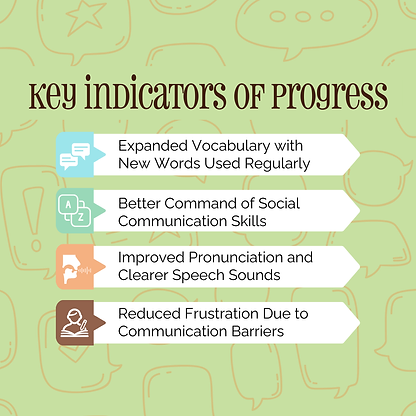
It’s not uncommon for us to be asked “How will I know if speech therapy is working for my child?” when we sit with parents during evaluations or consultations. If we’re being honest, it’s not always a cut-and-dry answer. Oftentimes, progress is subtle and not a pronounced milestone. There are times when there will be a significant milestone achievement but the progress made to hit that milestone was done in baby steps that aren’t as easily recognized. It’s important to learn the signs of progress made in speech therapy – it gives you some reassurance and allows you all to celebrate the small achievements that signify ongoing development. Here’s how you can monitor and appreciate your child’s journey towards better speech and language skills.
Understanding Milestones vs. Averages
Key Indicators of Progress

-
Increased Vocabulary: One of the clearest signs of progress is an expanding vocabulary. Take note if your child is using new words regularly and if they are beginning to combine words to form simple sentences.
-
Improved Pronunciation: Notice if your child’s speech sounds are becoming clearer. For instance, if they previously struggled with certain consonant sounds and can now pronounce them correctly, it’s a significant improvement.
-
Better Understanding and Following Directions: If your child is increasingly able to understand and follow instructions, even those involving multiple steps, it’s a good indication of their developing comprehension skills.
-
Enhanced Social Communication: Look for improvements in your child’s ability to engage in conversations, make eye contact, and use appropriate gestures. Enhanced interaction with peers and adults is a positive sign of progress.
-
Reduced Frustration: If your child seems less frustrated and is able to express their needs and thoughts more effectively, it indicates that they are overcoming communication barriers.
Tracking Progress
-
Journals and Logs: Keep a journal or log of new words, phrases, and significant milestones. Regularly update this log to visualize your child’s progress over time.
-
Video and Audio Recordings: Periodically record your child speaking. Comparing these recordings over weeks and months can provide a clear picture of their development.
-
Therapist Feedback: Regularly communicate with your child’s speech therapist. They can provide professional insights into your child’s progress and suggest areas to focus on at home.
-
Checklists and Milestone Charts: Use developmental checklists and milestone charts to track your child’s achievements. These tools can help you identify areas where your child is excelling or may need extra support.
Celebrating Small Achievements


Author
Amanda G. Tompkins, MS, CCC-SLP is the founder and owner of Gigi’s Kids Speech & Language Therapy and has been certified by the American Speech and Hearing Association (ASHA) since 2000. With over 25 years of pediatric experience, she has worked extensively in the Bloomfield Hills Schools Deaf and Hard of Hearing program and led a speech therapy department at a center affiliated with autism services. Amanda holds the ASHA Award for Continuing Education (ACE) and continues to share her expertise through trainings for preschools, parent groups, and educators.
